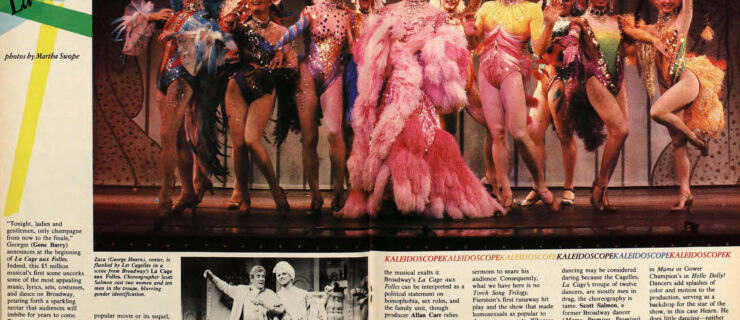Sergei Polunin, Unapologetic About His Social Media Spiral, Is Somehow Still Getting High-Profile Dance Jobs
After a slew of homophobic and misogynist Instagram posts got Sergei Polunin dropped from an engagement with the Paris Opéra Ballet and a host of other opportunities, we thought we’d heard the last of him for a while.
And he has been relatively quiet for the past two months, at least on social media. (In one interview he says that he deleted his Instagram; in another he says it was hacked and shut down.) We hoped he was taking time for a much-needed intervention—some of his posts were truly disturbing and suggested deeper issues at play.
But the quiet didn’t last long. Yesterday, The Guardian released an exclusive interview with Polunin—one that he initiated, approaching a writer who didn’t know about ballet because Polunin “hates talking about ballet.”
Polunin wanted to explain his recent activity on social media, his manager told writer Simon Hattenstone.
Great! We could all use some clarification about why he said that he wants to slap fat people and effeminate men. (Not to mention an explanation of his chest tattoo of Vladimir Putin.)
But the story left us with more questions—and made us wonder why his unacceptable behavior is still being normalized by those who continue to hire him for performances and program him for appearances.
In the interview, Polunin claims that his social media spiral began from a place of love. In September, he posted on Instagram that he wanted to “unite England, Russia and Ukraine.” But “nothing happened,” he says. It’s unclear if he means that his post did not inspire the three countries to “unite” or that he didn’t get a satisfactory amount of praise for his diplomatic efforts. Another “manifesto of love” intended for Instagram wouldn’t send. This was enough of a “sign” to redirect Polunin to post a message about his admiration for Putin instead.
From there, Polunin’s downward spiral seems to be a series of intentional acts of self-sabotage. When showing love for Putin didn’t inspire the feedback he wanted, he started posting threatening political messages instead. (He was then banned from returning to his home country of Ukraine and told by the “Russian administration” to “stop polluting” Russian media space.) The revelation of the chest tattoo came soon after.
Polunin told Hatterstone that he was enjoying the deluge of criticism. “The energy attacks your heart, your stomach, it almost throws you off balance. And it’s amazing to feel it because you feel a connection to the world,” he says. “The only way I knew how to build is to destroy everything and build from scratch. The most amazing feeling in the world is destroying. It takes so much strength and patience and time to build, and destruction is fast, fast, fast. Explosive.”
We know what came next: The homophobic posts that finally made the dance world take notice. “I see lots of pictures of males wearing pointe shoes and this is disgusting because you cannot flatten female and male energy because they are two different things,” he told Hatterstone. “Why are you lifting your legs like girls? What are you doing? Be a man.”
While making a similar point during an interview with journalist Tanit Koch at the DLD conference in January, Polunin goes as far as to say: “Everybody agrees with me. In the ballet world, everyone thinks that.”
As for the fat-shaming, he says that was a joke made only to get a reaction. But in the DLD interview Polunin says that “he doesn’t agree with when kids are fat.”
And while he admits that he isolated his friends and lost a significant amount of money, he doesn’t regret his recent behavior, instead calling it a “revelation, an epiphany.”
It’s easy to make a joke out of Polunin’s situation. And Hatterstone often does. But the dancer’s downfall should be taken seriously—both because of what it implies about his mental health, and because of the deeply troubling ideas that we normalize when we tolerate his behavior.
Take his swastika tattoo. “The ancient Slavik swastika is one of the nicest symbols if you carry it well. If you do destructive things, like Hitler did, it destroys you,” he told Hatterstone. “I really want to change this horrible thing about this beautiful light symbol.” Obviously, this tattoo and his justification of it would be unacceptable even if there wasn’t a rising tide of anti-Semitism and neo-Nazism in the West.
So why is he starring in a production of Spartacus at the Bavarian State Ballet later this month? Or presenting a show at The London Palladium in June?
In the DLD interview, he claims that everything he’s done has been on purpose, and that he’s been aware of the consequences all along. “To get attention sometimes you need to do something off,” he says.
We can’t excuse his behavior by supposing that he’s struggling with mental health or drug issues. But both scenarios are possible, and obviously, delicate.
Perhaps more delicate than Hatterstone’s tongue-in-cheek tone allows. And certainly too delicate to pretend like Polunin can go on performing as usual.




